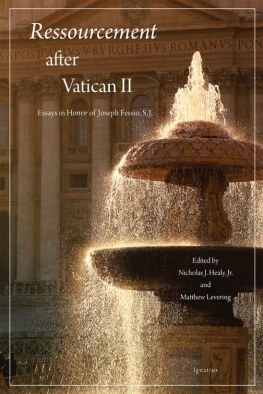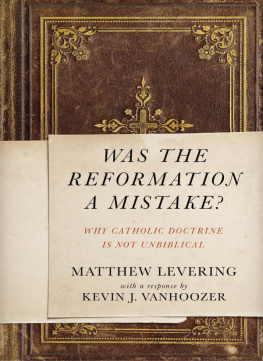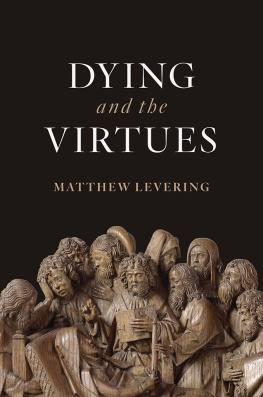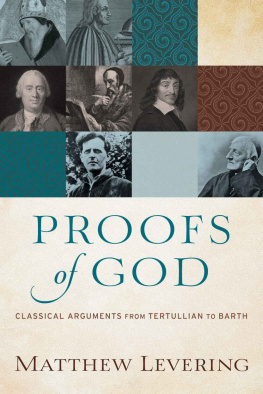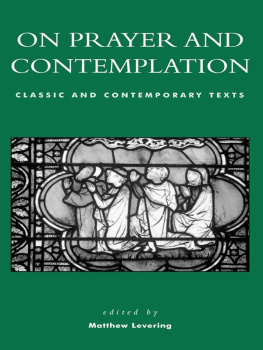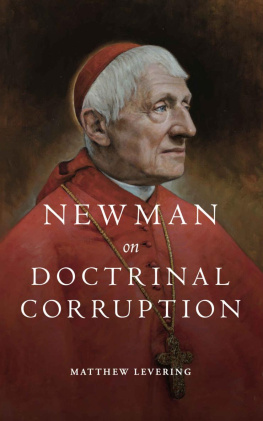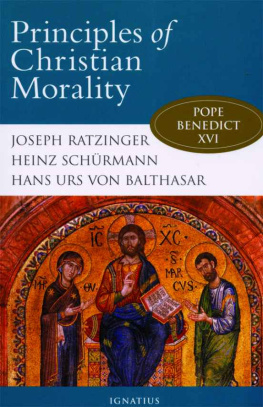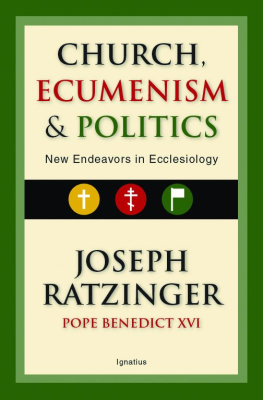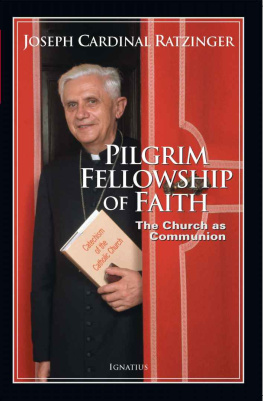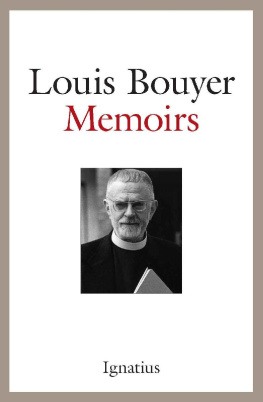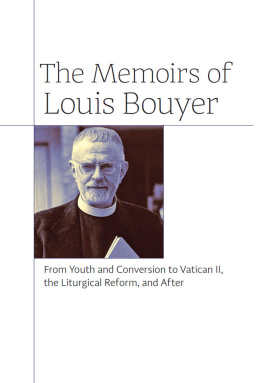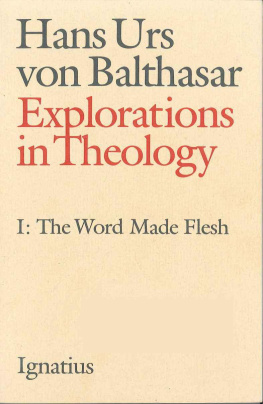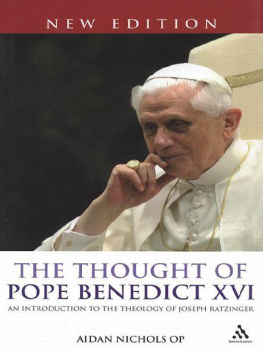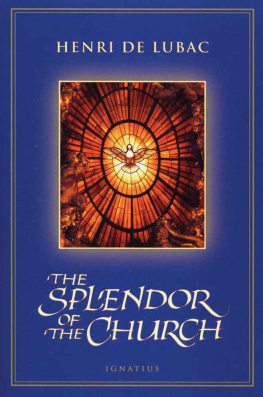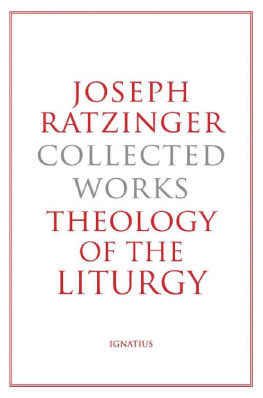RESSOURCEMENT AFTER VATICAN II
ESSAYS IN HONOR OF JOSEPH FESSIO, S.J.
Ressourcement after
Vatican II
Essays in Honor of
Joseph Fessio, S.J .
Edited by
Nicholas J. Healy, Jr., and Matthew Levering
IGNATIUS PRESS SAN FRANCISCO
Unless otherwise indicated, all English translations of papal and council documents have been taken from the Vatican website.
Cover photo:
Fontana Piazza San Pietro
iStock/Muttley572
Cover design by Roxanne Mei Lum
2019 by Ignatius Press, San Francisco
All rights reserved
ISBN 978-1-62164-276-3 (PB)
ISBN 978-1-64229-101-8 (eBook)
Library of Congress Catalogue number 2019931434
Printed in the United States of America
CONTENTS
1 David L. Schindler
Father Joseph Fessio, S.J.: A Personal Memoir
2 David Vincent Meconi, S.J.
The Mystical Body in the Nouvelle Theologie
3 Aaron Riches
Mysterium Fidei : On Tradition, Liturgy, and Being at the Service of the Church
4 Michael Dauphinais
The Ratzinger Option: Introducing Christianity in a Postmodern Age
5 Peter Casarella
Hans Urs von Balthasar and His Path to Reinhold Schneider
6 Stephen M. Fields, S.J.
From Classic to Patristic: Von Balthasar, Rahner, and the Origins of Analogy
7 Joseph S. Flipper
Reading the Mystery of God: The Ignatian Roots of Henri de Lubacs Understanding of Scripture
8 Matthew Levering
Marriage as an Image of the Trinity
9 Francesca Aran Murphy
What Does Hans Urs von Balthasar Mean by Drama?
10 Matthew J. Ramage
The Theological Mind and Method of Pope Benedict XVI as Revealed in His Catechetical Instructions
11 D. C. Schindler
Taking Truth for Granted: A Reflection on the Significance of Tradition in Josef Pieper
12 Anne M. Carpenter
Theological Aesthetics as Method
13 Nicholas J. Healy, Jr.
Henri de Lubac on the Development of Doctrine
INTRODUCTION
Nicholas J. Healy, Jr., and Matthew Levering
Joseph Fessio founded Ignatius Press forty years ago, in 1978, the same year that Karol Wojtyla became pope and after a decade of crisis and confusion in the Church and world. In 1978, the works of the great theologians of the Ressourcement movement were generally still unavailable in English translation. The leading American doctoral programs in theology functioned on a steady diet of translated works by Karl Rahner, Edward Schillebeeckx, and Jurgen Moltmann. The Catholic seminaries made do with Karl Rahner and more Karl Rahneran odd situation since in his 1972 The Shape of the Church to Come , Rahner had taught that priests were not strictly necessary for celebrating the Eucharist. Robert Barron, now auxiliary bishop of Los Angeles, has recalled that during his seminary studies in the 1980s, he was constantly assigned Rahners works, so much so that when he became a professor at the seminary, the natural thing for him to do first was to teach an S.T.L. course on Rahners theology.
The editors of this volume were born around 1970. In 1994, one of the editors (Matthew Levering), while attempting to become a novelist, asked himself whether there was a God and what would it mean if there were no God. For three days, he experienced the world as a place of shells and phantoms on the verge of eternal annihilation. On the third day, he went to Duke University Divinity School on the chance that there would be some books in their library that could teach him why people believed in God and in Jesus Christ and whether such belief was plausible today. Fortunately, the Duke Divinity School library was just then in the process of acquiring a number of books from Ignatius Press. Despite the old adage that one should not judge a book by its cover, their beautiful binding and ressourcement after vatican ii design stood out on the Divinity School librarys New Books shelf. Picking up books by von Balthasar, de Lubac, Ratzinger, and so on, Levering sat down to read and was profoundly moved, inspired, and changed by what he read.
The other editor, Nicholas Healy, also found himself gifted by Father Fessio and Ignatius Press at a crucial moment of his life. Raised Catholic, he was working at a corporate law firm in Pittsburgh, with plans to apply to law school. Following a recommendation from a professor of English literature, he subscribed to the journal Communio and borrowed a friends copy of von Balthasars Heart of the World . Within a few months, Healys plan to enter law school was replaced with an application to the graduate program in philosophy at Franciscan University of Steubenville. Through the mediation of another friend, Father Fessio encouraged Healys studies by sending an enormous box with volumes by von Balthasar, de Lubac, Pieper, and Ratzinger.
Such stories are legion; so many young Catholics and converts have gained access to the breadth and depth of the Catholic tradition by reading the books of Ignatius Press. Charles Pguy coined the term ressourcement to describe a movement from a less perfect tradition to a more perfect tradition, a call from a shallower tradition to a deeper tradition, a backing up of tradition, an overtaking of depth, an investigation into deeper sources; in the literal sense of the word, a re-source. For the authors translated and published by Father Fessio and Ignatius Pressde Lubac, Ratzinger, von Balthasar, Danilou, von Speyr, Bouyer, and many othersthe deepest source of theology is the Word of God interpreted within the Church. In a secondary sense, the Fathers and Doctors of the Church represent an abiding source for theological renewal. Like his mentor Henri de Lubac, Father Fessio has sought to make the Catholic tradition better known and loved. In the spirit of Saint Ignatius, his life has been characterized by obedience and service to the incarnate Word, whose humility reaches down to the written word that mediates the living tradition of the Church.
Thanks to the efforts of Ignatius Press in publishing the writings of Ressourcement theologians, young Catholics in seminaries and doctoral programs have received an attractive alternative to the theological liberalism that has severed its roots in the Catholic tradition. Classical theological liberalism began with Friedrich Schleiermacher as a Protestant enterprise but soon moved to the Catholic Church. Theological liberalism begins with the assumption that the biblical and dogmatic core of the Christian faith is unreliable and cannot be trusted as a witness to the truth of Christ and of God. Instead, therefore, the early (Protestant) liberal theologians proposed that Christian faith is actually simply about personal experience of the ineffable, of the ground of being. Liberal theology of all stripes argues that this experience cannot really be translated into propositional judgments, since personal experience of the ineffable is inextricably embedded within the specific historical contexts and world views of particular eras. Each era, then, should express its own God-consciousness in new formulations and new moral norms that are authentic to its own historical context and world view.
For liberal Christianity, the role of Christ in all this is to stand as an enduring model of human liberative praxis, of human commitment to the liberation of the poor and human freedom to manifest the presence of God in the world by not being bound by narrow legalisms or doctrinal systems. Christ, as the supreme manifestation of what it means to be human (and thus, on this view, as the supreme human manifestation of the divine), serves liberal theology as the basis for a constantly renewed thinking about liberative practices that will build an authentic human community of peace, justice, openness to the outcast, freedom from repressive systems, and love for all.
As the great Ressourcement theologians help us to see, however, theological liberalism unfortunately is built upon partial truths as well as upon the neglect of the more central truths of divine revelation. Theological liberalisms fundamental mistake is not recognizing that God has indeed spoken an enduring, intelligible word that commands the obedience of faith and that includes doctrinal and moral content for our salvation. By failing to allow for human knowledge of the transcendent God, by failing to perceive the depths of sin and death from which we must be rescued, and by failing to see the biblical story of the living Creator God (himself a Triune Communion) who comes forth in wondrous mercy and humble love to unite us to the life of the Trinity in an intimacy so supreme as to be marital, theological liberalism has failed to see the true source of peace and love-filled human community. The fruit of theological liberalism, as has been shown over and over again, is the death of living Christianity and the parallel emergence of a culturally approved standpoint of hedonistic statism mingled with existential despair.
Next page
